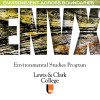2013 Panels
The “Wisdom of Nature”
The project of modernization has fundamentally entailed the reshaping of “nature.” Yet today the notion of modeling culture after nature is a recurrent theme in environmental discourse. Arguably, the impulse to restore ecosystems to a pre-human condition, the desire to model engineered structures on designs found in the non-human world, and the championing of ecosystem services, all suggest a sense that “nature knows best.” Where do such ideas originate, with whom do they resonate (or not), and what do they reveal about our own ambivalence about the process of modernization? This panel explores the ways that people seek to identify, understand, and replicate the “wisdom of nature” as well as the motivations and assumptions that underlie such efforts.
Back to the Past
Genetic manipulation, rewilding, managing entire ecosystems, and Jurassic Park style recreation of extinct species: this ain’t your grandma’s conservation. A new legion of bioengineers and ecosystem managers have entered the scene and brought a whole host of experimental tools to the table. As conservation enters a future of increasing possibility and uncertainty, in an age of extinction and decreasing biodiversity, we broach notions of what humankind is able to do, and what we should do.
The Biotic And The Bionic: Engineering The Future
Our futuristic perception of robots has long been preceded by a history of animatronic devices reaching back hundreds of years. At one point humans could only dream of having a bionic eye or manipulating biological functions. Now those ideas are on the horizon, if they don’t exist already. This raises questions about where to draw the line between the biotic and the bionic. How augmented can a person be but still be considered human? This panel will pose questions of ethics and augmentation while exploring the murky waters of cyborg technology and seeking out the boundaries between human and machine.
Narratives Of Nature: Forbidden Fruits
From myths and legends deifying natural phenomena, to literature like Mary Shelley’s iconic Frankenstein, we have recorded our struggles to control and explain both the forces of nature and our own instincts and desires. Yet in some cultures, “nature” is a concept that does not even exist. How have human perceptions of nature transformed over time and what are some factors influencing these changes? We now live in a world where we obsess over new technology and are constantly “plugged-in”. Have these new technologies altered our proximity to the “natural”? And if so, is this a threat to our relationship with the world around us, or an opportunity?
Messing with Creation
As genetic modification and hybridization of plants and animals increasingly normalizes, and printed, lab-grown foods become widely available, the future of food appears to be that of a sci-fi odyssey. These technologies claim to shorten commodity chains and decrease environmental resource strains, but at what price? Such new and experimental territory leaves us without appropriate methods of moral or ethical consideration; we are heading far outside the realm of Singer’s animal liberation, and Pollan’s conscious omnivory, we are heading to a no man’s land wherein the lines between plant, animal—and even human, are blurring beyond recognition. How do we approach manipulation in a world where genetic boundaries are becoming increasingly irrelevant?
Environmental Studies is located in room 343A of John R. Howard Hall on the Undergraduate Campus.
MSC: 62
email envs@lclark.edu
voice 503-768-7790
fax 503-768-7620
Symposium Advisor Jessica Kleiss
Environmental Studies
Lewis & Clark
615 S. Palatine Hill Road MSC 62
Portland OR 97219
